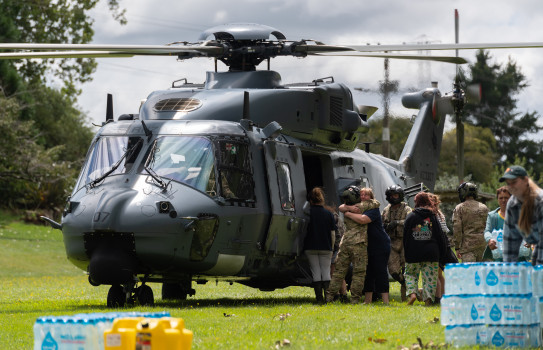Tohu Awards 2024
18 November 2024
Unfortunately you are viewing this website on an outdated browser which does not support the necessary features for us to provide an adequate experience. Please switch to a modern browser such as latest version of Google Chrome, Mozilla Firefox, Apple Safari or Microsoft Edge.
Ngā mihi nui
Royal New Zealand Air Force Base Ohakea’s No.3 Squadron has received the international Barry Marsden Memorial Award for its outstanding contribution to the preservation of life during Cyclone Gabrielle.
The award is presented by the United Kingdom-based Honourable Company of Air Pilots. It is named after Canadian pilot and aerial firefighter Barry Marsden, a founder of Conair, a company that specialises in aviation firefighting.
Cyclone Gabrielle hit the North Island in February last year, devastating parts of the Northland, Auckland, East Coast and Hawke’s Bay regions.
No. 3 Squadron was at the forefront of the New Zealand Defence Force’s response with four aircraft and 150 Air Force staff involved.
Master of the Honourable Company, Richie Piper, was in New Zealand recently and presented the award to the Commanding Officer of No. 3 Squadron, Wing Commander Chris Ross.
He recounted the squadron’s response, rescuing numerous people (including children and animals) stranded on the roofs of their homes, where floodwaters had almost completely submerged single-storey houses.
“At the end of the first day, a total of 23 people (and five dogs) were rescued by No. 3 Squadron crews. A significant number of these were completed by hoist under trying conditions, testing the limits of all involved,” said Mr Piper.
“Although only one part of a much larger response, No. 3 Squadron’s efforts in the days and weeks following Gabrielle represented an outstanding team effort, which in turn ensured the preservation of multiple lives of their fellow New Zealanders.”
“One rescue of note saw an individual with an existing spinal injury needing to be recovered from their bedroom on their second floor. This multiple-agency rescue was led by the NH90 winch person, who demolished the bedroom window, enabling the patient to be moved to the roof, winched into the helicopter and evacuated to Hastings Hospital,” said Mr Piper.
In the days following the initial response, the number of rescues decreased and the focus moved to the conduct of airborne logistical support, including the movement of industrial generators, food, water, supplies and people to isolated communities.
Over the whole period, the crews of No. 3 Squadron evacuated 384 people and 23 pets, transported 37 VIPs, and moved 25,600kg of external loads and 66,810kg of internal loads.

No.3 Squadron deliver supplies during the response to Cyclone Gabrielle.
Mr Piper said this was a whole-of-squadron effort - none of this would have been possible without the maintenance personnel of No. 3 Squadron whose efforts saw the NH90s break global flying rate records. They flew a total of 302.9 hours during the response (198.5 hours of which were flown in the first week).
“This is a remarkable achievement in itself, noting the lack of maintenance staff No. 3 Squadron had available at the time. This small group of deployed maintainers (supported by the remaining team in Ohakea) worked tirelessly in undesirable weather conditions, carrying out the regular daily servicing with the limited tools available, all the while doing so with a positive attitude, knowing that they were directly contributing to supporting those in need,” said Mr Piper.
Wing Commander Ross said there’s no better feeling than going out and doing a job and knowing you’ve helped someone.
“I remember seeing Esk Valley and Pakowhai for the first time after the flooding with hundreds of people and pets stranded on rooftops and horses and cattle swimming around in their backyards. You could see where people had climbed up into their attics and busted holes through the roof. People kept it together until they were in the helicopter with their loved ones and that’s when many started to cry, knowing they were now safe.”
The Barry Marsden Memorial means a lot to the squadron as it recognises the entire team of pilots, helicopter loadmasters, operations support and maintenance staff who were involved in the rescue effort, and the enduring support they gave for the month following the cyclone, said Wing Commander Ross.